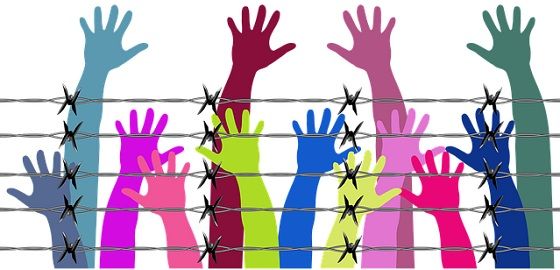 In general, ‘rights’ refers to the moral or legal entitlement over something. As per law, rights are considered as the reasonable claim of the individuals which are accepted by the society and approved by statute. It can be fundamental rights or human rights. The rights which are fundamental to the life of the citizens of a country are known as fundamental rights.
In general, ‘rights’ refers to the moral or legal entitlement over something. As per law, rights are considered as the reasonable claim of the individuals which are accepted by the society and approved by statute. It can be fundamental rights or human rights. The rights which are fundamental to the life of the citizens of a country are known as fundamental rights.
On the other hand, human rights imply the rights that belong to all the human beings irrespective of their nationality, race, caste, creed, gender, etc.
The main difference between fundamental rights and human rights is that the fundamental rights are specific to a particular country, whereas human rights has world wide acceptance. Take a read of this article to get some more differences on these two.
Content: Fundamental Rights Vs Human Rights
Comparison Chart
| Basis for Comparison | Fundamental Rights | Human Rights |
|---|---|---|
| Meaning | Fundamental Rights means the primary rights of the citizens which are justifiable and written in the constitution. | Human Rights are the basic rights that all the human beings can enjoy, no matter where they live, what they do, and how they behave, etc. |
| Includes | Basic Rights Only | Basic and Absolute Rights |
| Scope | It is country specific. | It is universal. |
| Basic Principle | Right of freedom | Right of life with dignity |
| Guarantee | Constitutionally guaranteed | Internationally guaranteed |
| Enforcement | Enforceable by the court of law. | Enforceable by United Nation Organization. |
| Origin | Originated from the views of democratic society. | Originated from the ideas of civilized nations. |
Definition of Fundamental Rights
Fundamental Rights as the name suggests, are the basic rights of the citizens of a country that are approved by the Supreme court and recognized by the society. These are enshrined in the constitution and they are enforceable in the court of law, in the sense that if there is any kind of violation of the right the individual can go to the court for the protection of his/her right, that is way they are known as fundamental rights.
Fundamental Rights applies to the all the people equally, regardless of their caste, religion, gender, race, origin, etc. It ensure civil liberty, so that all the citizens of the country can lead their life in the way they want.
The list of fundamental rights in India are given below:
- Right to freedom
- Right to equality
- Right to freedom of religion
- Right to constitutional remedies
- Cultural and Educational rights
- Right against exploitation
- Right to Privacy
Definition of Human Rights
Human Rights are universal, absolute and fundamental moral claims, in the sense that they belong to all human beings, they are inalienable and are basic to a real living.
These are essential for all the individuals, irrespective of their caste, creed, nationality, place of birth, citizenship and any other status. All individuals enjoy same human rights, without any discrimination.
Human Rights are basic rights of the people that advocate fairness, equality, freedom and respect for all. These are extremely important for the betterment of the society, as it abolishes various practices like injustice, exploitation, discrimination and inequality.
Some of the common human rights are, freedom from discrimination, right to life, equality before the law, liberty and personal security, right to education, freedom of thought, right to free movement, etc.
Key Differences Between Fundamental Rights and Human Rights
The points given below explain the difference between fundamental rights and human rights:
- The elemental rights of the citizens of a country, which are mentioned in the constitution and enforceable under the law is known as fundamental rights. On the other extreme, human rights are the rights that a human being needs to survive with respect and freedom.
- Fundamental rights includes only those rights which are basic to a normal life. On the contrary, human rights include those rights which are basic to a real life and are absolute, i.e. it cannot be taken away.
- While fundamental rights are country specific, i.e. these rights may vary from country to country, human rights have a global acceptance, meaning that all the human beings enjoy these rights.
- The fundamental rights rely on the basic principle of the right of freedom. As against, the human rights are based on the right of life with dignity.
- Fundamental rights are guaranteed under the constitution of the country, whereas the human rights are recognised at international level.
- Both fundamental and human rights are enforceable in nature, but the former is enforced by the law court, and the latter is enforced by the United Nation Organization.
- Fundamental rights are derived from the views of a democratic society. Conversely, human rights emerge from the ideas of civilised nations.
Conclusion
Fundamental Rights and Human Rights are vital for the existence and development of individuals. It helps to create a better environment and better living conditions for people, as well as they, preserve their dignity.






Dr Subrata Biswas says
Very nice
Dione Belda says
It is so easy understanding